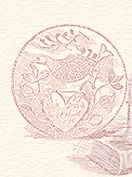A Very Brief Introduction to the Pennsylvania German Language
Pennsilfaanisch Deitsch, Pennsylvania German or Pennsylvania Dutch
in English, is a dialect of High German that is related to dialects
spoken in the ancestral home of the Pennsylvania Germans in the
Rhineland-Palatinate and also contains some elements of other
southwestern German and Swiss dialects. Although there are variants of
the dialect even within Pennsylvania, native speakers from different
regions have no trouble conversing with each other. No one is quite
certain when the various dialects spoken in Europe coalesced into what
we now know as Pennsylvania German, but the first self-conscious
attempts at writing in the dialect occur in the 1830s and '40s.
While many 19th and early 20th century writers predicted the end of
the language in a generation or two, Pennsylvania German was commonly
used in everyday speech in rural southeastern Pennsylvania into the
1950s. A variety of factors have led to the decline in use of the
dialect, but there are those who continue to promote its use. The Old
Order Amish and Old Order Mennonites still use Pennsylvania German as
their everyday language. Grundsau Lodsches and other organizations
sponsor classes to teach the dialect to people of all ages. They also
hold Versammlinge, large gatherings at which only the dialect is spoken,
and several churches hold annual services in Pennsylvania German. Some
local newspapers in Pennsylvania and Ohio publish columns written in the
dialect, and two radio programs are still on the airwaves, one of them
on the Internet (see our Links page).
The Pennsylvania German Society also supports efforts to preserve
the language, both in spoken and written form. For those wishing to
learn the dialect, consider taking one of the classes listed below. To
see some of the best of Pennsylvania German literature, please read Earl
Haag's ("Der Alt Professor") weekly dialect column and English
translation on this page. The Society has long published oral
traditional and written literary material in the dialect, and we offer a
number of publications in the dialect for sale, including Eugene Stine's
Pennsylvania German Dictionary, which includes both Pennsylvania German
to English and English to Pennsylvania German sections. For these
titles, please see our Publications page. Also, most issues of Der
Reggeboge, the Society's journal, contain a dialect piece.
|













